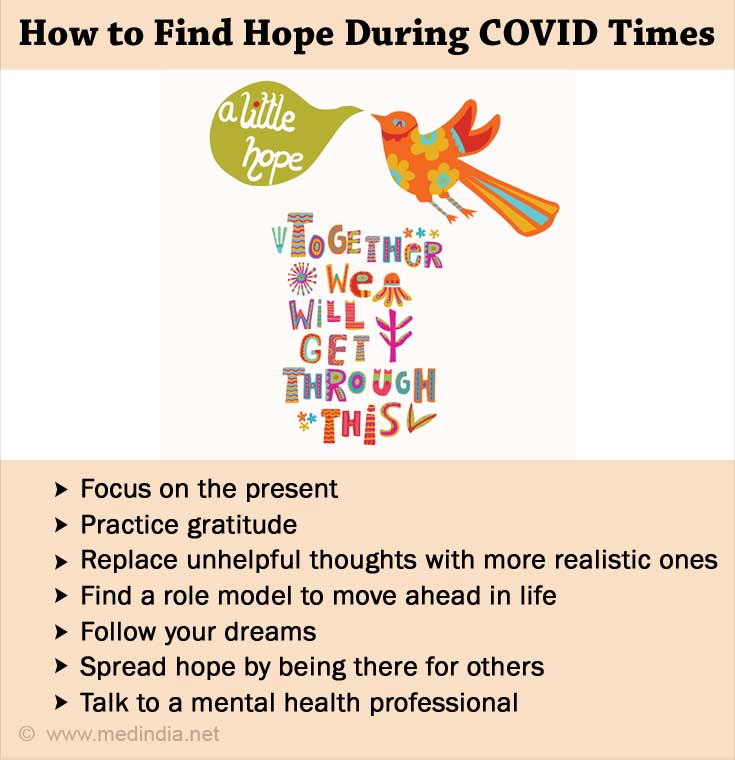- NCBI SARS-CoV-2 Resources - (https://www.ncbi.nlm.nih.gov/sars-cov-2/)
- How to Create a More Hopeful Life - (https://www.lifehack.org/articles/lifestyle/how-to-create-a-more-hopeful-life.html)
- Coronavirus disease (COVID-19) - (https://www.who.int/health-topics/coronavirus#tab=tab_3)
- How to find hope during the pandemic - (https://www.nuffieldhealth.com/article/how-to-find-hope-during-the-pandemic)
- COVID-19 disrupting mental health services in most countries, WHO survey - (https://www.who.int/news/item/05-10-2020-covid-19-disrupting-mental-health-services-in-most-countries-who-survey)
- COVID-19: A reminder of the power of hope and solidarity - (https://www.undp.org/blogs/covid-19-reminder-power-hope-and-solidarity)
- Long-term effects of coronavirus (long COVID) - (https://www.nhs.uk/conditions/coronavirus-covid-19/long-term-effects-of-coronavirus-long-covid/)
- What Is Long COVID (PASC)? - (https://www.webmd.com/lung/what-is-long-covid-pasc#1)
- 60 Quotes from Viktor Frankl on Love and the Meaning of Life - (https://www.goalcast.com/viktor-frankl-quotes/)
What is COVID-19?
Coronavirus or COVID is an infectious respiratory illness that became a worldwide pandemic in 2020. The symptoms of the infection include fever, sore throat, cough, body ache, loss of smell and taste and fatigue.
In recent times, COVID-19 was also associated with other health conditions like black fungus due to reduced immunity caused by taking steroids. In children, conditions such as Multisystem Inflammatory Syndrome in Children or MIS-C can develop.
Health authorities have recommended staying at home, washing hands frequently, wearing a mask and maintaining a social distance of 6 feet from others when outside. The times have been tough and the upkeep of joy and hope, a task. Let us look at how this can be improved.
What is COVID-related Stress?
COVID has been a stressful period for almost all in multiple ways. Staying inside the home for months on end without being able to meet loved ones has taken a toll on many. In addition to this, for those facing financial issues or loss of employment, the circumstances are worse. Fear of falling sick and losing close friends and family to COVID is also a constant stressor.
Work from home has become the new normal but it presents additional challenges like lack of fixed timings, extra work and working with limited resources. Parents also have the extra responsibility of children who are not in school. For school children, not being able to meet friends and play outside can be tough. Learning online has also been difficult for both children and their parents, who now may have to be more involved in their education on a day-to-day basis.
Mental health issues during COVID-19 have increased. For individuals already suffering from mental health issues, the uncertainty, social isolation, financial constraints and fear of catching the illness can worsen symptoms making the situation at home more stressful. Domestic violence has also increased in this period with many not having an option to leave home.
How to Find Joy during COVID Times?
Prioritizing our happiness during a pandemic is highly important. While one disease ravages the world outside, any are also suffering silently inside with mental health issues. Finding ways to maintain well-being can help manage the tough circumstances better.
Ways to enhance joy include:

- Maintaining a gratitude journal and noting down things one is grateful for at the end of each day
- Finding ways to stay socially connected through virtual means or in-person with precautions
- Spending time with family members and pets
- Engaging in hobbies everyday
- Following healthy sleeping schedules
- Eating healthy and tasty food
- Exercising regularly in order to increase endorphins and serotonin
- Learning new skills such as cooking, baking, gardening, music instruments or a new language
- Playing games with family members
- Staying in the present moment, living one moment at a time instead of thinking about the past or future
- Being kind in the way we talk to ourselves and working on self-acceptance
- Helping others in need such as migrants, economically disadvantaged individuals, victims of COVID and animals and through various means
- Seeking professional help if needed
How to Find Hope during COVID Times?
During the second world war, a psychiatrist, Victor Frankl was separated from his family and subjected to extreme hardship at concentration camps. Many of his fellow captives died but he managed to stay alive and emerged from the war as a philosopher with a new revolutionary therapy, logotherapy.
He states, “We must never forget that we may also find meaning in life even when confronted with a hopeless situation, when facing a fate that cannot be changed.” He stressed upon finding meaning in life even in the most adverse situations.
Similarly, in the current times, having hope can significantly enhance one’s well-being. However tough the circumstances may be, we can still find meaning in them, which helps us find happiness in hardship.
Research shows that patients who have hope have a greater level of endorphins and dopamine, both which increase positive feelings. Higher levels of hope were found to be linked to an increased chance of exercising, greater life satisfaction and lower risk of death.
Ways to foster hope during a pandemic include:

- Focusing on the present can make things manageable
- Finding a sense of purpose
- Noting down unhelpful thoughts and replacing them with more realistic ones
- Finding a source of inspiration like a role model to keep oneself going
- Looking at practical action that can be taken to deal with a particular situation
- Spreading hope by being there for others can increase one’s own sense of hope
- Talking to a mental health professional
Hope is also associated with lower levels of depression, a stronger purpose and reduced loneliness. In stressful situations, people with hope are less likely to experience burnout. Let’s turn our tough circumstances into opportunities to make ourselves better and live with joy and hope during COVID times.







